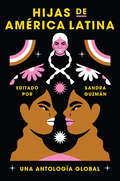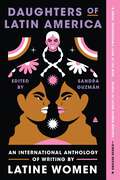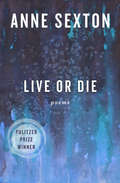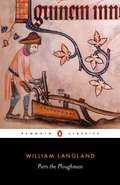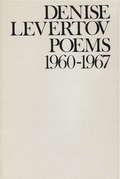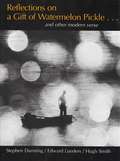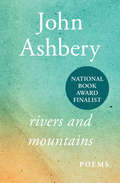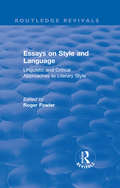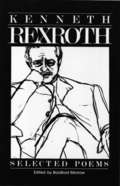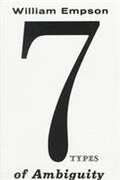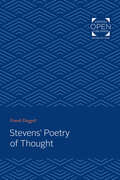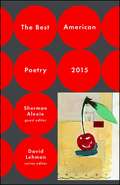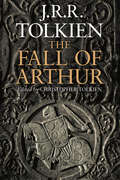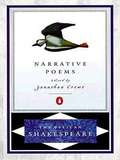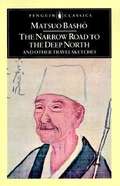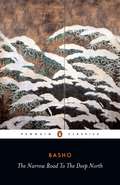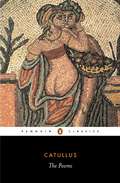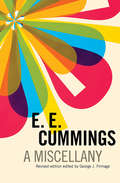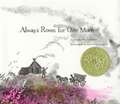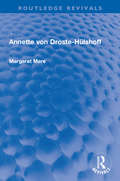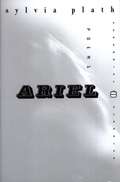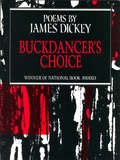- Table View
- List View
Daughters of Latin America \ Hijas de América Latina (Spanish edition): Una antología global
by Sandra GuzmanUNA EXTRAORDINARIA SELECCIÓN DE OBRAS ESENCIALES, EN SU MAYORÍA INÉDITAS, QUE CELEBRAN LA FUERZA, EL TALENTO Y LA DIVERSIDAD DE LAS MUJERES LATINAS, Y TIENDEN PUENTES QUE NOS CONECTAN LAS UNAS CON LAS OTRAS.Desde la prosa implacable de sor Juana Inés de la Cruz hasta los poderosos cantos de la chamana María Sabina; desde las luchas revolucionarias de Audre Lorde, Lolita Lebrón y Berta Cáceres hasta el activismo de Alexandria Ocasio-Cortez; desde los versos pioneros de Cecilia Vicuña, Maryse Condé, Nancy Morejón y Conceição Evaristo hasta la poesía transgresora de Elizabeth Acevedo, Sonia Guiñansaca y Ada Limón, 140 mujeres de América Latina y el Caribe se juntan en esta colección sin precedentes. Un fascinante universo lírico que celebra las voces nacientes, alentadas y alimentadas por quienes, con sus plumas como machetes, despejaron el camino.«Esta antología fue inspirada para reunirnos y contrarrestar juntas la invisibilización y los mitos que existen en torno a la literatura y el talento de las poderosas Hijas de América Latina, en donde quiera que estemos alzando nuestras voces: de Chicago a São Paulo, de Loíza a Asunción, de Portsmouth a Puerto Príncipe, del Bronx a Buenos Aires, de Chiapas a Los Ángeles, y más allá». —de la introducción por Sandra Guzmán.----AN EXTRAORDINARY SELECTION OF ESSENTIAL WORKS THAT CELEBRATE THE STRENGTH, TALENT, AND DIVERSITY OF LATINE WOMEN, AND BUILD BRIDGES THAT CONNECT US TO ONE ANOTHER.From the relentless prose of Sor Juana Inés de la Cruz to the powerful chants of the shaman Maria Sabina; from the revolutionary struggles of Audre Lorde, Lolita Lebrón, and Berta Cáceres to the activism of Alexandria Ocasio-Cortez; from the pioneering verses of Cecilia Vicuña, Maryse Condé, Nancy Morejón, and Conceição Evaristo to the transgressive poetry of Elizabeth Acevedo, Sonia Guiñansaca, and Ada Limón, 140 women from Latin America and the Caribbean come together in this unprecedented collection. A fascinating lyrical universe that celebrates the emerging voices, nurtured and encouraged by those who, with their pens as machetes, cleared the path."This anthology has been inspired to disrupt erasure and myths, to gather us, the powerful literary Daughters of Latin America, from Chicago to São Paulo, from Loíza to Asunción, from Portsmouth to Puerto Príncipe, from the Bronx to Buenos Aires, from Chiapas to Los Ángeles, and beyond". —from the introduction by Sandra Guzmán
Daughters of Latin America: An International Anthology of Writing by Latine Women
by Sandra GuzmanSpanning time, styles, and traditions, a dazzling collection of essential works from 140 Latine writers, scholars, and activists from across the world—from warrior poet Audre Lorde to novelist Edwidge Danticat and performer and author Elizabeth Acevedo and artist/poet Cecilia Vicuña—gathered in one magnificent volume.Daughters of Latin America collects the intergenerational voices of Latine women across time and space, capturing the power, strength, and creativity of these visionary writers, leaders, scholars, and activists—including 24 Indigenous voices. Several authors featured are translated into English for the first time. Grammy, National Book Award, Cervantes, and Pulitzer Prize winners as well as a Nobel Laureate and the next generation of literary voices are among the stars of this essential collection, women whose work inspires and transforms us.An eclectic and inclusive time capsule spanning centuries, genres, and geographical and linguistic diversity, Daughters of Latin America is divided into 13 parts representing the 13 Mayan Moons, each cycle honoring a different theme. Within its pages are poems from U.S. Poet Laureate Ada Limón and celebrated Cervantes Prize–winner Dulce María Loynaz; lyric essays from New York Times bestselling author Naima Coster, Pulitzer prize-winning playwright Quiara Alegría Hudes, and Guggenheim Fellow Maryse Condé; rousing speeches from U.S. Representative Alexandra Ocasio-Cortez, and Lencan Indigenous land and water protector Berta Caceres; and a transcendent Mazatec chant from shaman and poet María Sabina testifying to the power of language as a cure, which opens the book.More than a collection of writings, Daughters of Latin America is a resurrection of ancestral literary inheritance as well as a celebration of the rising voices encouraged and nurtured by those who came before them. In addition to those mentioned above, contributors include Elizabeth Acevedo, Julia Alvarez, Albalucia Angel, Marie Arana, Ruth Behar, Gioconda Belli, Miluska Benavides, Carmen Bouollosa, Giannina Braschi, Norma Cantú, Ana Castillo, Sandra Cisneros, Ingrid Rojas Contreras, Angie Cruz, Edwidge Danticat, Julia de Burgos, Lila Downs, Laura Esquivel, Conceição Evaristo, Mayra Santos Febres, Sara Gallardo, Cristina Rivera Garza, Reyna Grande, Sonia Guiñasaca, Georgina Herrera, María Hinojosa, Claudia Salazar Jimenez, Jamaica Kincaid, María Clara Sharupi Jua, Amada Libertad, Josefina López, Gabriela Mistral, Celeste Mohammed, Cherrié Moraga, Angela Morales, Nancy Morejón, Anaïs Nin, Achy Obejas, Alejandra Pizarnik, Yolanda Arroyo Pizarro, Elena Poniatowska, Laura Restrepo, Ivelisse Rodriguez, Mikeas Sánchez, Esmeralda Santiago, Rita Laura Segato, Ana María Shua, Natalia Toledo, Julia Wong, Elisabet Velasquez, Karla Cornejo Villavicencio, Helena María Viramontes, and many more.
Live or Die: Poems
by Anne SextonWinner of the Pulitzer Prize: A gripping poetry collection mapping the thorny journey from madness to hope With her emotionally raw and deeply resonant third collection, Live or Die, Anne Sexton confirmed her place among the most celebrated poets of the twentieth century. Sexton described the volume, which depicts a fictionalized version of her struggle with mental illness, as "a fever chart for a bad case of melancholy." From the halls of a psychiatric hospital--"the scene of the disordered scenes" in "Flee on Your Donkey"--to a child's playroom--"a graveyard full of dolls" in "Those Times . . ."--these gripping poems offer profound insight on the agony of depression and the staggering acts of courage and faith required to emerge from its depths. Along with other confessional poets like Sylvia Plath and Robert Lowell, Sexton was known for grappling with intimate subjects traditionally considered taboo for poetry such as motherhood, menstruation, and drug dependence. Live or Die features these topics in candid and unflinching detail, as Sexton represents the full experience of being alive--and a woman--as few poets have before. Through bold images and startlingly precise language, Sexton explores the broad spectrum of human emotion ranging from desperate despair to unfettered hope.
Piers the Ploughman
by William LanglandWritten by a fourteenth-century cleric, this spiritual allegory explores man in relation to his ultimate destiny against the background of teeming, colorful medieval life.
Poems of Denise Levertov, 1960-1967
by Denise LevertovDenise Levertov's Poems 1960-1967 brings together all of the poetry first published in The Jacob's Ladder (1961), O Taste and See (1964), and The Sorrow Dance (1967). Denise Levertov's Poems 1960-1967 brings together all of the poetry first published in The Jacob's Ladder (1961), O Taste and See (1964), and The Sorrow Dance (1967). This new compilation, beginning where her Collected Earlier Poems 1940-1960 (New Directions, 1979) left off, shows both a refining of the poet's craft and a widening of her concerns." We are living our whole lives in a state of emergency," she wrote in 1967. Levertov's staunch antiwar stand is reflected here in such poems as "Life at War" and "What Were They Like?" with what Kenneth Rexroth called "the special luster of a sensibility that never sacrifices humaneness to intensity." Side by side with her poetry of protest is that of celebration--"Song for Ishtar," "Come into Animal Presence," " Luxury"--and tolerance for "The Mutes" uttering "those groans men use/passing a woman on the street...to tell her she is female" as well as for "The Ache of Marriage." Here also are a meditation "During the Eichmann Trial," "Olga Poems" (a sequence in memoriam), and "Say the Word," the poet's first published story.
Reflections on a Gift of Watermelon Pickle ... and Other Modern Verse
by Edward Lueders Stephen Dunning Hugh SmithHere are modern poems chosen for their individual excellence and their special appeal to young people. From lighthearted Phyllis Mc-Ginley to pessimistic Ezra Pound; from the lyricism of Edna St. Vincent Millay to the vigor of Lawrence Ferlinghette; from Carl Sandburg on loneliness to Paul Dehn on the bomb -- such is the range. The little known or unknown poet and the widely recognized appear side by siide. Whatever the subject matter -- pheasant or flying saucer; lapping lake water or sonic boom; a deer hunt, a basketball, or a bud -- it is all poetry reflecting today's images and today's moods. The editors spent several years bringing together 1200 poems they considered fine enough to include, then slowly and carefully sifted out of 114 which appear in the book. Readers of Reflections on a Gift of Watermelon Pickle . . . and Other Modern Verse may well be tempted by Eve Merriam's suggestion in "How to Eat a Poem" Don't be polite Bite in. Pick it up with your fingers and lick The juice that may run down your chin. It is ready and ripe now, whenever you are. Completely formatted following the standard established for poetry books for the Bookshare collection to make the poetry readable and easily navigated for all readers.
Rivers and Mountains: Poems
by John AshberyFrom one of our most important modern poets comes an essential early collection, including the famous long poems &“The Skaters&” and &“Clepsydra&”When Rivers and Mountains was published in 1966, American poetry was in a state of radical redefinition, with John Ashbery recognized as one of the leading voices in the New York School of poets. Ashbery himself had just returned to America from ten years abroad working as an art critic in France, and Rivers and Mountains, his third published collection of poems, is now considered by many critics to represent a pivotal transition point in his artistic career. The poet who would gain widespread acclaim with his multiple-award-winning Self-Portrait in a Convex Mirror (1975) is, in this collection, still very much engaged in the intimate, personal project of taking his poetry apart and putting it back together again, interrogating not just the act of writing but poetry itself—its purpose, its composition, its fundamental parts. Nominated for a National Book Award by a panel of judges that included W. H. Auden and James Dickey, Rivers and Mountains includes two of Ashbery&’s most studied and admired works. &“Clepsydra,&” which takes its name from an ancient device for measuring the passage of time, echoes both the physical form and the philosophical weight of a water clock in its contemplation of the experience of time as it passes. &“The Skaters,&” the long poem that closes the collection, was immediately praised as a masterpiece of modern American poetry, and is the work that perhaps most clearly introduces the voice for which Ashbery is now well known and loved: generous, restless, wide-ranging, and human.
Routledge Revivals: Linguistic and Critical Approaches to Literary Style (Routledge Revivals)
by Roger FowlerFirst published in 1966, this book is contributed to by authors who share an interest in the literary uses of language. The book gives a close analysis of the language of literature contributed to by critics and linguists, examining linguistic theory and poetry, and as part of this the rhythm and metre of English poetry is deconstructed. Language and its emotive structure is analysed, while the middle chapters of the book address the interaction of linguistic dimensions. Two medievalist scholars conclude the volume, giving a well-rounded examination to the broad and complex study of literary style in the English language. This book is suitable for students and scholars concerned with English literature and linguistics.
Selected Poems
by Kenneth RexrothThe late Kenneth Rexroth (1905-1982) is surely one of the most readable of this century's great American poets. He is also one of the most sophisticated. Like William Carlos Williams, he honed his writing to a controlled and direct language. His intellectual complexity matches Wallace Stevens, his polymath erudition Ezra Pound. He is first among our nature poets. His love poems and erotic lyrics are unsurpassed. Rexroth's Selected Poems brings together in a single volume a representative sampling of sixty years' work. Here are substantial passages from his longer poems: The Homestead Called Damascus(1920-1925), begun while the poet was in his teens; the cubist Prolegomenon to a Theodicy (1925-1927); the philosophical masterpiece The Phoenix and the Tortoise (1940-1944) and The Dragon and the Unicorn (1944-1950); and the meditative The Heart's Garden, The Garden's Heart (1967). The shorter poems were originally gathered in In What Hour (1940), The Art of Wordly Wisdom (1949),The Signature of All Things (1950), In Defense of the Earth (1956), Natural Numbers(1964), New Poems (1974), and The Morning Star (1979).
Seven Types of Ambiguity
by William EmpsonRevised twice since it first appeared, it has remained one of the most widely read and quoted works of literary analysis. Ambiguity, according to Empson, includes "any verbal nuance, however slight, which gives room for alternative reactions to the same piece of language." From this definition, broad enough by his own admission sometimes to see "stretched absurdly far," he launches into a brilliant discussion, under seven classifications of differing complexity and depth, of such works, among others, as Shakespeare's plays and the poetry of Chaucer, Donne, Marvell, Pope, Wordsworth, Gerard Manley Hopkins, and T. S. Eliot.
Stevens' Poetry of Thought
by Frank DoggettOriginally published in 1966. Stevens' Poetry of Thought is the first full-length study of Wallace Stevens as a thinker. With original insight, Mr. Doggett provides many detailed interpretations of individual poems in examining Steven's imagery. This is a pertinent treatment of Stevens' inherent affinity with the philosophic imagination of his time, showing how firmly this poet was linked through his images with the leading thinkers of the age just passed—especially Schopenhauer, Bergson, Santayana, Whitehead, William James, Jung, and Cassirer. The clear and perceptive reading of a great many of the poems in this book should illuminate the work of Stevens for all the readers who admire his language and wish for further insight into its significance. Beyond being a definitive exposition of Steven' poetry and a meaningful act of faith in the intellectual sophistication of Stevens, this is an exciting study of the human imagination which satisfies the need for distinction between poetry and philosophy while illuminating one by the other. Mr. Doggett demonstrates how the poetry of Stevens is a representative voice of the ideas of his age and illustrates Stevens own statement: "Poets and philosophers often think alike, as we shall see." Wallace Stevens is now recognized as one of the most important American poets of the twentieth century. His first volume of poems, Harmonium was published in 1923, and since then seven volumes of his work have appeared. He was awarded the Bollingen Prize in Poetry of the Yale University Library for 1949. In 1951 he won the National Book Award in Poetry for The Auroras of Autumn. The Collected Works of Wallace Stevens was awarded the Pulitzer Prize in Poetry in 1955. From 1916 to his death in 1955 he was associated with the Hartford Accident and Indemnity Company, of which he became vice-president in 1934.
The Best American Poetry 2015 (The Best American Poetry series)
by Sherman Alexie David LehmanThe premier anthology of contemporary American poetry continues with an exceptional volume edited by award-winning novelist and poet Sherman Alexie.Since its debut in 1988, The Best American Poetry has become a mainstay for the direction and spirit of American poetry. Each volume in the series presents the year's most extraordinary new poems and writers. Guest editor Sherman Alexie's picks for The Best American Poetry 2015 highlight the depth and breadth of the American experience. Culled from electronic and print journals, the poems showcase some of our leading luminaries--Amy Gerstler, Terrance Hayes, Ron Padgett, Jane Hirshfield--and introduce a number of outstanding younger poets taking their place in the limelight. A leading figure since his breakout poetry collection The Business of Fancydancing in 1992, Sherman Alexie won the National Book Award for his novel The Absolutely True Diary of a Part-Time Indian. He describes himself as "lucky enough to be a full-time writer" and has written short stories, novels, screenplays, and essays--but he is at his core a poet. As always, series editor David Lehman's foreword assessing the state of the art kicks off the book, followed by an introductory essay in which Alexie discusses his selections. The Best American Poetry 2015 is a guide to who's who and what's happening in American poetry today.
The Fall of Arthur
by Christopher Tolkien J.R.R. TolkienThe Fall of Arthur, the only venture by J.R.R. Tolkien into the legends of Arthur, king of Britain, may well be regarded as his finest and most skillful achievement in the use of Old English alliterative meter, in which he brought to his transforming perceptions of the old narratives a pervasive sense of the grave and fateful nature of all that is told: of Arthur's expedition overseas into distant heathen lands, of Guinevere's flight from Camelot, of the great sea battle on Arthur's return to Britain, in the portrait of the traitor Mordred, in the tormented doubts of Lancelot in his French castle. Unhappily, The Fall of Arthur was one of several long narrative poems that Tolkien abandoned. He evidently began it in the 1930s, and it was sufficiently advanced for him to send it to a very perceptive friend who read it with great enthusiasm at the end of 1934 and urgently pressed him, "You simply must finish it!" But in vain: he abandoned it at some unknown date, though there is evidence that it may have been in 1937, the year of publication of The Hobbit and the first stirrings of The Lord of the Rings. Years later, in a letter of 1955, he said that he "hoped to finish a long poem on The Fall of Arthur," but that day never came. Associated with the text of the poem, however, are many manuscript pages: a great quantity of drafting and experimentation in verse, in which the strange evolution of the poem's structure is revealed, together with narrative synopses and significant tantalizing notes. In these notes can be discerned clear if mysterious associations of the Arthurian conclusion with The Silmarillion, and the bitter ending of the love of Lancelot and Guinevere, which was never written.
The Heights of Macchu Picchu
by Pablo Neruda Nathaniel TarnFinest longer poem by well-known Chilean poet. This bilingual edition presents the poem both in the original Spanish and in English translation.
The Narrative Poems
by William Shakespeare Stephen Orgel A. R. Braunmuller Jonathan Crewe"I feel that I have spent half my career with one or another Pelican Shakespeare in my back pocket. Convenience, however, is the least important aspect of the new Pelican Shakespeare series. Here is an elegant and clear text for either the study or the rehearsal room, notes where you need them and the distinguished scholarship of the general editors, Stephen Orgel and A. R. Braunmuller who understand that these are plays for performance as well as great texts for contemplation." (Patrick Stewart) The distinguished Pelican Shakespeare series, which has sold more than four million copies, is now completely revised and repackaged. Each volume features: * Authoritative, reliable texts * High quality introductions and notes * New, more readable trade trim size * An essay on the theatrical world of Shakespeare and essays on Shakespeare's life and the selection of texts
The Narrow Road to the Deep North and Other Travel Sketches
by Nobuyuki Yuasa Matsuo BashMatsuo Bash(1644 - 1694), later known as Matsuo Chemon Munefusa,was the most famous poet of the Edo period in Japan. In his haiku poems, Basho described the natural world with great simplicity and delicacy of feeling.
The Narrow Road to the Deep North and Other Travel Sketches
by Matsuo Basho'It was with aweThat I beheldFresh leaves, green leaves,Bright in the sun'When the Japanese haiku master Basho composed The Narrow Road to the Deep North, he was an ardent student of Zen Buddhism, setting off on a series of travels designed to strip away the trappings of the material world and bring spiritual enlightenment. He writes of the seasons changing, the smell of the rain, the brightness of the moon and the beauty of the waterfall, through which he sensed the mysteries of the universe. These writings not only chronicle Basho's travels, but they also capture his vision of eternity in the transient world around him.Translated with an Introduction by Nobuyuki Yuasa
The Poems (Classics Ser.)
by CatullusOne of the most versatile of Roman poets, Catullus wrote verse of an almost unparalleled diversity and stylistic agility, from the brevity of the epigram to the sustained elegance of the elegy. This collection contains all of Catullus' extant work and includes his lyrics to the notorious Clodia Metelli - married, seductive and corrupt - charting the course from rapturous delight in a new affair to the torment of love gone sour; poems to his young friend Iuventius; and longer verse, such as the extraordinary tale of Attis, a Greek youth who castrates himself in a fit of religious ecstasy. Ranging from the tender, moving and passionate to the vicious and even obscene, these are poems of astonishingly modern force and content.
The White Goddess
by Robert GravesA history of poetic myth of the White Goddess as maid, nymph and crone in many lands and many times.
Time for a Rhyme
by Ellen WilkieShare this book with a child age three and up. With your help children can guess words to rhyme with thirteen starter words. They turn the page to find the book's examples of words that match the clue. All clues and answers are illustrated with cheerful, large, easy to identify pictures which are described. Three or four additional rhymes are given for each of the main rhyming pairs. Here's a fun learning game to play with the little one in your life. It can also ease a child into snuggling down and going to sleep.
A Miscellany (Revised)
by E. E. Cummings George James FirmageA Miscellany, confined to a private edition for decades, sheds further light on the prodigious vision and imagination of the most inventive poet of the twentieth century: E.E. Cummings. Formally fractured and yet gleefully alive and whole, E. E. Cummings’s groundbreaking modernist poetry expanded the boundaries of language. In A Miscellany, originally released in a limited run in 1958, Cummings lent his delightfully original voice to “a cluster of epigrams,” a poem, three speeches from an unfinished play, and forty-nine essays—most of them previously written for or published in magazines, anthologies, or art gallery catalogues. Seven years later, George J. Firmage—editor of much of Cummings’s work, including Complete Poems—broadened the scope of this delightfully eclectic collection, adding seven more poems and essays, and many of Cummings’s unpublished line drawings. Together, these pieces paint a distinctive portrait of Cummings’s eccentric, yet precise, genius. Like his poetry, Cummings’s prose is lively; often witty, biting, and offbeat, he is an intelligent observer and critic of the modern. His essays explore everything from Cubism to the circus, equally quick to analyze his poetic contemporaries and satirize New York society. As Cummings wrote in his original foreword, A Miscellany contains “a great deal of liveliness and nothing dead.” This remains true today, more than fifty years after its original publication.
Always Room for One More
by Sorche Nic LeodhasLachie MacLachlan, the generous hero of this enchanting picture book, is the delightful exception to the rule that the Scots are a thrifty lot. To his "wee house in the heather" where he lives with his wife and ten children, the good-natured Lachie invites every traveler who passes on a'stormy night, assuring all that "there's always room for one more.'" Tinkers, tailors, shepherds, even dogs -sing and dance the night away until, alas, the rafters groan and the walls of his hospitable little home bulge to the bursting point. But Lachie's kindness is repaid. Just how his grateful guests eventually say a wonderful "thank-you" provides a delightfully warm ending to this lilting narrative.
Annette von Droste-Hülshoff (Routledge Revivals)
by Margaret MareFirst published in 1965, Annette von Droste-Hülshoff is the first book about the great German poetess of the early nineteenth century in English. Delicate, fey, over-sensitive, unstable, with the intellect often described as unbecomingly masculine, it is easy to see how Annette von Droste-Hülshoff was bound to flout the conventions of the conservative society she lived in and to suffer accordingly. But melancholy and despairing as many of her poems are, we are never allowed to imagine her as a weak person. Margaret Mare is careful to show us her trenchant humour, her gift of mimicry, her generosity to her friends, the resolution which made her refuse, in the middle of a dangerous illness, to treat herself ‘like a soap bubble or a soft egg’—giving us a full picture of the woman of genius who could prophesy confidently that her works would still be read a hundred years after her death. Divided into three parts the book deals with the poet’s life and background, detailed interpretations of selected poems, and, the poet’s treatment of supernatural themes, her epics and prose works, her style and use of images. This book will be an essential read for scholars and researchers of poetry, literature, German literature, European literature, and comparative literature.
Ariel
by Sylvia PlathThis all-new edition of Sylvia Plath's shattering final poems--with a foreword by Robert Lowell--will appear during National Poetry Month.
Buckdancer's Choice: Poems (Wesleyan Poetry Program #Vol. 28)
by James DickeyWhoever looks to a new book by James Dickey for further work in an established mode, or for mere novelty, is going to be disappointed. But those who seek instead a true widening of the horizons of meaning, coupled with a sure-handed mastery of the craft of poetry, will find this latest collection satisfying indeed.Here is a man who matches superb gifts with a truly subtle imagination, into whose depths he is courageously traveling--pioneering--in exploratory penetrations into areas of life that are too often evaded or denied. "The Firebombing," "Slave Quarters," "The Fiend"--these poems, with the others that comprise the present volume, show a mature and original poet at his finest.<P><P> Winner of the National Book Award
